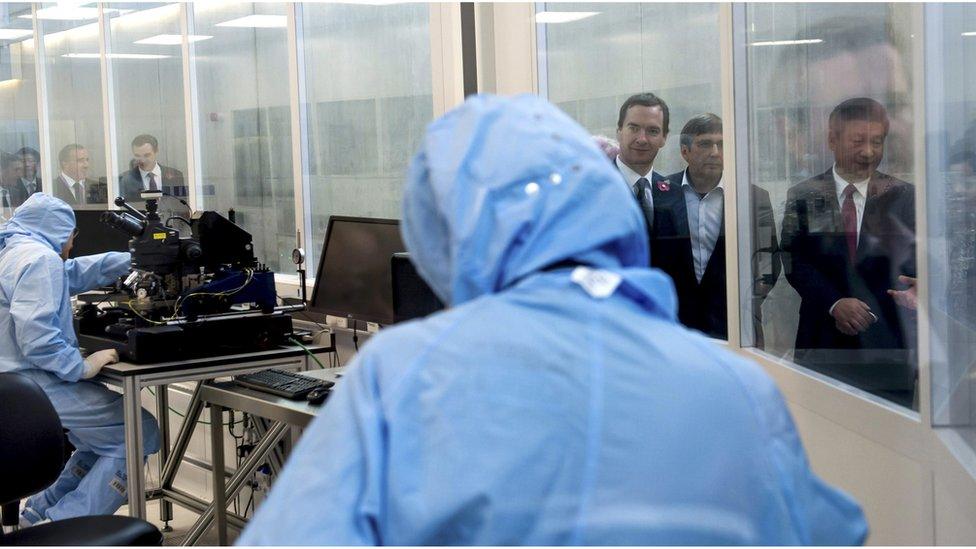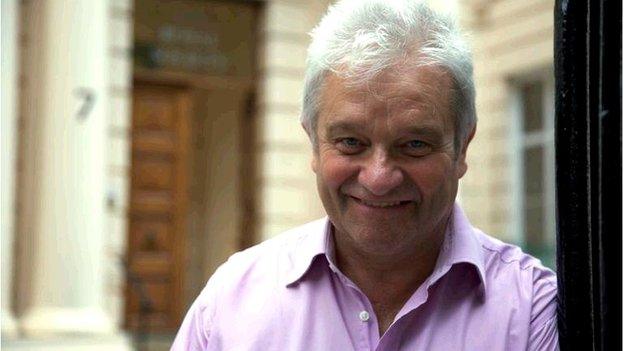Nurse Review proposes single agency for UK science funding
- Published

George Osborne shows off the UK's national graphene institute to China's President Xi Jinping
A government-commissioned review says UK science funding should be determined by a single independent agency.
It argues this body should liaise with a committee of ministers, chaired by a senior cabinet figure.
The report, external offers the research community an opportunity to reform in return for increased financial security and engagement from politicians.
Critics say that centralised control could lead to political interference and the funding of "pet projects".
The review has been produced by one of the country's most respected scientists, Royal Society president Sir Paul Nurse. He says the aim of his proposals is to put science "at the heart of government".
"The aim of these proposals is to provide a good interface between the scientists and the politicians, because science and technology will impinge increasingly on everything the government, and we, do," he told BBC News.
"For that I am proposing a ministerial committee chaired by a senior minister, so we have the political will for science and can use it for the good of the UK."
Sir Paul has not said which senior minister should be in charge, but his proposals match Chancellor George Osborne's likely narrative in next week's Comprehensive Spending Review: that cuts are necessary in order to invest in the UK's economic future.
Thursday's report was commissioned by the Treasury and the Department for Business, Innovation and Skills (BIS). According to Sir Paul, the chancellor has taken a close personal interest in the conclusions.
Since taking up his position in 2010, George Osborne has increasingly become interested in science.
He is said to have been persuaded that research can be harnessed to increase productivity.
Specific expertise
Mr Osborne and the Science Minister, Jo Johnson, are also keen to see a greater proportion of public funds invested in research outside of the South East of England, in order to encourage the growth of high tech jobs across the economy which would be an issue that the new agency, to be called Research UK, could consider.
Sir Paul's ideas, if accepted, would offer ministers an opportunity to discuss funding directly with scientists, in return for science having a more prominent role in government and society.
He himself admitted that this could be perceived as "doing a deal with the devil", but said that his proposed reorganisation would be good for research and good for society.
Currently, the government shares a total of £3.2bn between seven research councils. These councils are responsible for different scientific disciplines and have built up expertise in how best to allocate money within their specific research areas.
These are all arms-length bodies, independent of government. Sir Paul is proposing greater co-ordination, under the control of an independent body called Research UK (RUK).

Sir Paul Nurse is the current president of the Royal Society
This would be a replacement, with greater powers, for the present coordinating body - Research Councils UK.
The new set-up would be overseen by an independent board, which would act as a buffer between the research community and a group of ministers, chaired by a senior minister with an overview of government.
Critics, who have asked to remain anonymous, fear the creation of a super research council that would lead to the funding of pet projects favoured by the chancellor and vocal ministers.
"We absolutely have to talk to politicians," Sir Paul argued. "We as scientists cost a lot of money - we have to justify what we do.
"We have to engage with politicians if we are to maintain support for science, which is for the public good and promotes the economy. But we have to have a proper political discussion and that interface, I want to promote."
There are also concerns that the chief executive of the new super council, who would be a senior civil servant, might also direct research to their own preferred areas.
This, the critics warn, would lead to an erosion of a system that has led to the UK funding some of the best research in the world.
Supporters of the proposed reform, however, believe that there is value in scientific research being led by a powerful civil servant with a "hotline" to the Treasury.
Sir Paul has said that the current specialist research councils would remain - although there would be scope in future to see if the current divisions between disciplines were appropriate.
"I am very strongly opposed to merging the research councils. Research UK will periodically have to review the research councils to see if they are fit for purpose, and there could be changes in the future - those may be legitimate.
"I think it is important to focus on what we are trying to deliver. We want strong, independent research councils who know their community. All of that should be maintained and we can use research UK to deliver that more effectively, and give science a stronger voice in government."
Follow Pallab on Twitter, external
- Published9 November 2015

- Published29 September 2015

- Published17 July 2015
